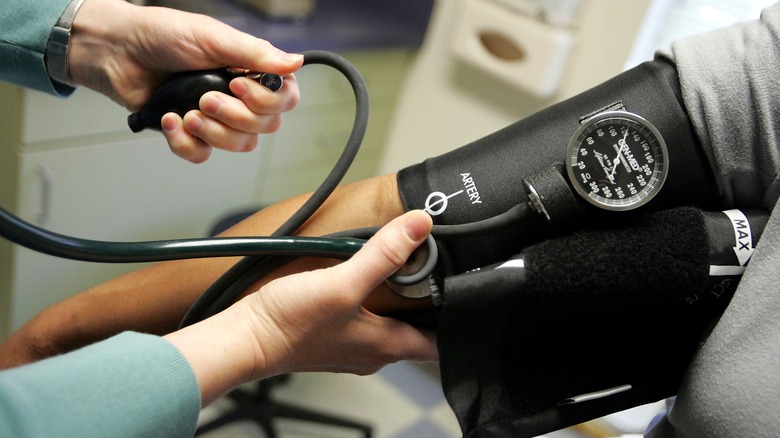What Happens To Your Body When You Hate Your Job
Job dissatisfaction is a common experience among working people in the United States. According to FlexJobs, one in three people are thinking about leaving their current employer. FlexJobs conducted a survey involving 2,202 people to learn whether they wanted to quit their jobs, and the results indicated that over half of the respondents were unhappy enough at work to want to leave. In fact, 25% of them had already done so. The main reason for the unhappiness leading to this mass departure was cited as toxic company culture. Other contributing factors include burnout, limited career progression, poor mental health support, and scheduling inflexibility.
Your job takes up a significant amount of your time, averaging anywhere from 5.6 to 7.8 hours each working day (via Bureau of Labor Statistics). If you're unhappy at work, it can cause stress that takes a measurable toll on your well-being. The type of stress you may experience at work activates your fight-or-flight response, which results in changes like increased heartrate and muscle tension (via Centers for Disease Control and Prevention). Workplace stress is often ongoing, and may lead to unwanted health issues (via World Health Organization). Keep in mind, though, that you're experiencing concerning symptoms, it's important to visit your doctor to rule causes other than work stress.
You might not sleep well
Job stress and sleep deprivation go hand in hand: They can each make the other worse (via Psych Central). According to a 2021 survey by the American Psychological Association (APA), 66% of adults in the U.S. identified their jobs as a significant source of stress, and for 74% of them, this stress resulted in physical effects like sleep changes.
The American Academy of Sleep Medicine (AASM) explains that a common cause of job-related insomnia is dwelling on work issues after you've left the office. This type of rumination can keep you awake at night, and even cause you to dream about your job. AASM lists three main job stressors as common causes of insomnia: minimal control over decisions, excessive work demands, and high professional compromise.
A good night's sleep may be even harder to achieve if you engage in unhealthy coping strategies to manage work stress. Psych Central lists overeating and alcohol consumption as two such strategies, both of which can worsen insomnia. The Sleep Foundation explains that the increased digestive requirements following large meals can interfere with sleep. Alcohol affects sleep by the way it metabolizes in your body: After the initial sedating effect wears off, the remaining alcohol in your system prevents you from entering the important rapid eye movement (REM) and deep stages of sleep (via Cleveland Clinic).
You might feel tired often
If you're unhappy at your job, you might experience emotional exhaustion. This is commonly known as burnout and features reduced energy levels as one of its symptoms (via Mayo Clinic). Job burnout has various causes, including stress from a lack of control and social support, dysfunctional workplace dynamics, and work-life imbalance. A small amount of stress can be energizing, according to HelpGuide. It can increase your alertness and may even improve your job performance. However, if your job stress is ongoing, it can cause physical symptoms that interfere with your sleep. The result can be debilitating recurring fatigue. According to a study published in BMC Psychiatry, you can experience this type of work-stress fatigue even without co-occurring depression.
If you can't change the stressful circumstances at your job, there are other steps to take that may increase your energy levels. HelpGuide suggests reaching out to coworkers, family, and friends for support. Sometimes sharing your experience with the people in your life can be cathartic and healing. Improving your physical health through nutrition, exercise, and improved sleep hygiene can also make a difference in the amount of fatigue you feel.
You may experience regular headaches
According to the Mayo Clinic, you may be more likely to develop headaches while you're experiencing stress. Migraines and tension headaches are often the result of stress-related triggers, although you may develop other types of headaches as well. Work stressors that can cause headaches range from important issues like project deadlines to minor irritants like delays caused by lost items or traffic congestion.
Head, scalp, neck, and shoulder tension can cause headaches (via Medline Plus). Activities like computer work that require your head to stay in one position for extended periods of time can cause this kind of tension. However, emotional stress can also lead to the muscle tension that triggers headaches.
When you encounter a perceived threat, your sympathetic nervous system (fight-or-flight response) causes changes in your body designed to protect you from harm (via Healthline). Muscular tension is one of these changes, set in motion as an injury-prevention measure. When the threat passes, your muscles relax. If the threat lingers, as might be the case with workplace stress, your muscles can remain in a state of chronic tension, which can lead to headaches.
Your muscles might ache
Stress-related tension can do more than just cause headaches. The sympathetic nervous system's protective muscle-tensing stress response extends to multiple areas of the body, including lower back and upper extremities, according to the American Psychological Association (APA). This results in muscle aches, which for some people are intense enough to curtail physical activity and leave them bedridden (via Anxiety Centre). In addition to muscle aches, you might also experience cramps or spasms because of job stress tension.
The American Institute of Stress explains how this is just the beginning of an unhealthy cycle stemming from work stress. Muscle aches can reduce the frequency with which you exercise, which can increase the chance of issues like heart disease, cancer, and type 2 diabetes (via the CDC). It can also prompt you to use pain medication. Most medication is safe if you take it as directed, but as WebMD cautions, taking too much can cause unwanted health effects like kidney disease, stomach bleeding, and liver damage.
You may experience gastrointestinal issues
A review in the World Journal of Gastrointestinal Pathophysiology (WJGP) refers to job stress as one of the most serious health concerns in the world. Your gastrointestinal tract (GIT) can experience many stress-related changes, including ulcers, irritable bowel syndrome (IBS), and upset stomach. The WJGP lists work-related anxiety, tension, resentment, frustration, and emotional conflict as some of the contributors to gastric ulcers.
Diarrhea is another possible outcome of occupational stress (via Medical News Today). When your sympathetic nervous system activates, your gut releases hormones that speed up the action of your large intestine while slowing the movements of your stomach and small intestine. The purpose of these changes is to rid your body of harmful toxins, and the result is diarrhea.
According to the Anxiety & Depression Association of America (ADAA), the gut is second only to the brain in the number of nerves it contains. The two regions share a strong connection, making the GIT reactive to stress signals from the brain. Anxiety can result in your body's stress chemicals entering your digestive tract. This can interfere with digestion, reduce your production of antibodies, and cause various gastrointestinal conditions because of the disruption to healthy gut microorganisms. These conditions can increase your anxiety and stress even further, creating a disruptive cycle that significantly impacts your wellbeing.
You might get sick more easily
Psychological stress isn't just physically and emotionally uncomfortable — it can affect your immune system too (via Stress Challenges and Immunity in Space). Job stress can change your inflammatory processes and the way your body responds to infectious agents. It can also impact wound healing, vaccination response, cancer, and autoimmunity. Chronic stress disrupts the balance of your cytokines, which are small proteins that help to control your immune system cells (via the American Cancer Society). This suppresses the efficacy of your immune-protective cells. Your mood can intensify these effects, so if you're stressed and unhappy at work, you're even more likely to become ill.
According to an editorial in Frontiers in Immunology, chronic stress can result in persistently elevated levels of corticosteroid and cortisol. This contributes to a cortisol resistance, as well as anti-inflammatory impairments. This can lead to issues like cancers, chronic infection, and inflammatory autoimmune disease. The chronic stress you're feeling from the job you hate can also interfere with the communication between your immune systems cells and their signaling networks. The result is that you may be spending more of your time managing illness.
Your appetite may change
The science behind stress eating involves changes to brain stress and motivation circuits like the mesolimbic dopaminergic system, according to Minerva Endocinologica. This can make your reward sensitivity more responsive to foods that are "hyper-palatable." These are typically highly processed foods that contain sugar, carbohydrates, sodium, and fat. These cerebral stress effects can also trigger metabolic changes that promote weight and body fat increases.
Your fight-or-flight response to short-term stress can suppress your appetite (via Harvard Health Publishing). However, if you're experiencing persistent stress like the kind you feel at a job you don't like, your adrenal glands release the hormone cortisol. One of the results of elevated cortisol is an increased motivation to eat. Heightened cortisol, along with higher levels of insulin, may contribute to your enhanced appetite and preference for sugary and fat-laden food. This type of food suppresses stress-related responses, which can increase the chance you'll want more of the same food again.
For some people, chronic stress causes persistent appetite loss (via Healthline). Stress symptoms like nausea, stomach pain, and muscle tension can make eating unappealing. You may miss your body's hunger cues if they're hidden underneath the effects of stress. Eating can also produce discomfort if you've developed a stress-related gastrointestinal complication like an ulcer.
Your weight may change
According to Healthline, prolonged stress can contribute to abdominal weight gain. A review published in Current Obesity Reports supports this theory and explains that there's a connection between increased abdominal size and higher long-term cortisol levels measured in scalp hair. Cortisol is a type of glucocorticoid, or hormone produced by your adrenal glands (via Cleveland Clinic). Glucocorticoids control metabolism in your liver, muscles, bones, and fat.
It may seem like stress-induced appetite changes are the culprit behind increases in belly fat, but there's more at work on a cellular and hormonal level than simply higher calorie intake. Stress can also impact epigenetics and lead to weight changes (via Nutrition & Metabolism). The CDC describes epigenetics as environmental and behavioral influences and their impact on the way your genes work. Stress is a type of external exposure that can trigger epigenetic changes and may alter fat tissue metabolism. Increased inflammation, insufficient oxygen levels, and the presence of white blood cells in fat tissue can also affect metabolism and contribute to the effects of obesity.
You might lose your libido
You may have heard the term "dead bedroom," which Women's Health describes as a romantic relationship that has remained sexless for an extended period of time, like months or even years. Lack of communication and weight gain are two contributing factors to this intimacy drought, but the cause that tops the list is work stress.
During times of increased stress, your sympathetic nervous system triggers physiological changes geared towards survival, and not reproduction (via Self). Stress-induced increases to your cortisol levels lowers your reproductive drive. Intrusive thoughts also play a role: If you're preoccupied with thinking about work, you may be too distracted for intimacy. According to Healthy Male, the brain is your primary sex organ, and stress-mediated cognitive preoccupation can reduce your arousal response. The metabolic changes from work stress leading to weight gain and negative body image can also add to the list of reasons that work stress contributes to a reduced libido.
Your risk of heart disease can increase
A research review published in the Journal of the American Heart Association (JAHA) describes job strain as a contributing factor to the type of job stress that can play a role in cardiovascular disease. High work demands, such as having to perform under the pressure of time constraints, is an example of a workplace characteristic that can lead to this type of strain. Others include low levels of control in areas like decision making, minimal variations in required skills, and few learning opportunities. The review authors indicate that low control is a key factor that impacts job strain.
A review in Current Cardiology Reports estimates that work stress increases a person's risk of heart disease and stroke by 10-40%. Differences in age, sex, and socioeconomic background result in only minimal heart disease occurrence differences, suggesting that work stress is the main contributor. Working long hours and job insecurity are additional factors besides job strain that may elevate your heart disease risk.
Your blood sugar may increase
Glucose, or sugar, is your body's main source of fuel (via MedlinePlus). It's found in your blood stream where it's easily accessible to cells, tissues, and organs. It's also stored in your muscle tissues and liver for future use. It's no wonder that stress can increase your blood sugar, as your sympathetic nervous system responds to stress by increasing the availability of fuel. If your stress is ongoing, like the type you'd encounter in a job where you're unhappy, you may experience continued high blood sugar called hyperglycemia, which can lead to type 2 diabetes.
Having extra fuel in your blood may not seem like such a bad thing. However, excess blood sugar increases the viscosity, or thickness, of your blood. This can lead to heart disease if you have type 2 diabetes (via Frontiers in Physiology). Blood that is too thick can lead to blockages in capillaries, which are your smallest blood vessels, and the location of essential blood-gas transfer. Blocked capillaries lead to the tissue death that contributes to the lengthy list of diabetes complications, including heart disease, vision loss, and kidney failure.
Your blood pressure may increase
According to Harvard Health Publishing, chronic job stress can increase blood pressure. As part of the sympathetic nervous system stress response, your levels of the hormones epinephrine and norepinephrine increase. This makes your heart work harder and your blood vessels narrow (vasoconstriction). High blood pressure is the result of increased cardiac output combined with narrower blood vessels.
Vasoconstriction can help you during an acute crisis in several ways (via Healthline). It can protect you from fluid loss and excessive bleeding. It redirects blood volume to your vital organs to conserve body heat. Vasoconstriction can also distribute critical oxygen and nutrients as needed. However, this type of physiological response is only meant to be temporary, in immediate crises. When you live with job stress and your sympathetic nervous system activates often, you have an increased chance of developing high blood pressure. This can cause serious complications like heart failure, kidney disease, dementia, stroke, and atherosclerosis (via Journal of Experimental Medicine).
You may feel mental fatigue
Mental fatigue can stem from the emotional exhaustion or burnout you may experience while unhappy at work, and it can interfere with your functioning in several ways (via Healthline). For example, you might have trouble concentrating, or you may have lost your motivation. This can impact your job performance and make your stress level even worse. Mental exhaustion that lingers can impact your ability to solve problems, process and control emotions, and even simply think (via Healthline).
The World Health Organization (WHO) describes burnout as an occupational phenomenon. Unmanaged chronic job stress can lead to job burnout, causing outcomes like exhaustion and mental distance from your job. Healthline lists working at a job that you hate among the factors that can lead to emotional exhaustion. Other causes include working long hours or persistently performing under pressure.
The link between the ongoing stress you feel at work and your mental fatigue may involve neuroinflammation. An article published in the Journal of Psychosocial Nursing explains that chronic, low-level inflammation is detrimental to both the body and mind. The efficacy of medications that improve functioning while reducing inflammation suggests there's a link between inflammation and brain fog. A research review in Psychopharmacology describes the way that stress can cause neuroinflammation because of elevated white blood cell activity in the brain. So, if you've been feeling mental fatigue, low-level brain inflammation from job stress might be the reason.
You may experience menstrual cycle changes
Stress, including the kind from an unhappy work environment, can cause changes to your menstrual cycle. According to Cleveland Clinic, this is because of the impact that stress has on hormones. Under ordinary circumstances, the hypothalamus in your brain initiates a cascade of chemical signals through your pituitary gland to your ovaries, which results in the release of the menstrual-inducing hormones estrogen and progesterone. However, when you're under stress, cortisol can interfere with this signaling and cause changes to your period. You may experience late or light periods, or you might not menstruate for an extended length of time.
Not all menstrual irregularities are the result of stress, though (via the Journal of Clinical & Diagnostic Research). There may be other underlying causes for symptoms like changes to flow duration and amount. So, if your period is late, this could be the result of stress. However, if your period is heavy or prolonged, it's wise to check in with your doctor. Dysmenorrhea, or frequent and severe cramps and pain during your period, may be from something other than stress, and is another sign that you should seek a medical assessment.















